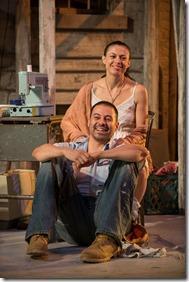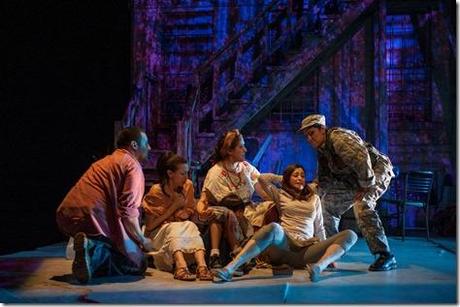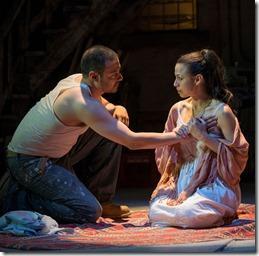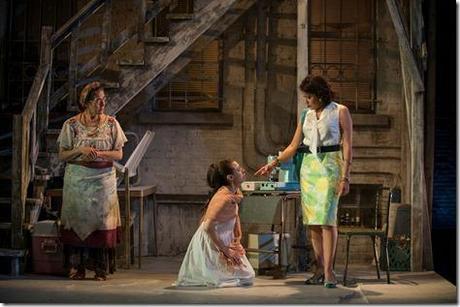
Mojada
Written by Luis Alfaro
Directed by Chay Yew
Victory Gardens Theater, 2433 N. Lincoln (map)
thru Aug 11 | tickets: $30-$60 | more info
Check for half-price tickets
Read entire review
Mixed results for Pilsen-based Medea

Victory Gardens Theater presents
Mojada
Review by Lawrence Bommer
Hoping to repeat the success of Oedipus El Rey, the critically acclaimed Latino version of Sophocles’ tragedy by Victory Gardens’ playwright Luis Alfaro, Mojada (meaning “wetback”) is Alfaro’s commissioned “spin-off” of Euripides’ Medea. It’s now been transformed into the tale of a sorceress scorned in Chicago’s Pilsen neighborhood. The localization lets Alfaro address, for better and worse, issues that Euripides never dealt with as he concentrated on telling a universal tale of humiliation and revenge. We’re told more than shown about class and political discrimination against illegal immigrants, the ravages of gentrification, fratricidal/patriarchal oppression, the wrongs of rape, the perils of crossing the border, and the betrayal of the “barrio.” This is no “raza unida.”

No magic realism (other than a combustible dress borrowed from the ancients) enlarges Alfaro’s rigorously realistic retelling. As Medea, Sandra Delgado, always electrifying but strangely muted until the end, is a seamstress, not a “bruja,” living and loving only for her common-law husband Jason (Juan Francisco Villa, blue-collar basic and emotionally clueless). Also an illegal immigrant, this stereotypical striver wants instant Chicago success as a well-connected contractor. To this stereotypical creep the excuse–“It’s just business”–trumps love and loyalty.
Medea’s only allies are amiable baker and confidante Josephina (warm Charin Alvarez) and aged Tita (wonderful Socorro Santiago), who acerbically and sometimes hilariously depicts a scathing and outspoken Chorus.
Using his non-marriage to Medea as an excuse for abandoning her, supposedly for the sake of his son Acan (Dylan M. Lainez on opening night), this ungrateful social climber kisses and fucks up to his boss Armida (Sandra Marquez, reveling in melodramatic malice), an unscrupulous developer who would turn Pilsen and Little Village into condos if she could. (The set we see is the ugliest backside of a tenement ever depicted, all but crying out for projections that illustrate the story.) If Jason marries the haughty parvenu Armida, he’ll have his golden ticket to citizenship while Medea, minus a green card, is ripe for deportation.
Though faithful in some details (like Medea’s one-day eviction notice), Mojada seems like a “telenovella” that departs from the concentrated crisis of 5th century Athens’ drama by failing to show how dependent Jason is on Medea or how isolated she feels in her new city. But extensive scenes—the best stuff on this stage—do depict the family’s perilous crossing to Nogales and finally Chicago. Other flashbacks, some arriving too late to matter, reveal the agonies of migrant farming and why a disinherited Medea murdered her brother and left Mexico.
But where it counts—the setup for the horrible murder and infanticide—Mojada is less than convincing. That’s partly because Delgado, depicting a traditionally submissive and now dangerously alienated Chicana, had been so maddeningly meek throughout that the mere minutes it takes her to morph into a monster seem unrealistic. (Yes, “hell hath no fury like…” but the murder of her son seems gratuitous, as it never did in Euripides.) In this tabloid tale Medea is too much a victim, not the active agent of a doomed destiny. It would be the same if this crime of passion were moved to Winnetka: This adaptation of the great Greek tragedy feels branded and “ghetto-ized,” more like a Lifeline “battered woman” spin-off or a Telemundo soap opera, than a timeless tale of a scorned witch’s terrible vengeance.
Rating: ★★
Mojada continues through August 11th at the Zacek McVay Theater, 2433 N. Lincoln (map), with performances Tuesdays-Thursdays at 7:30pm, Saturdays at 4pm, Sundays 3pm. Tickets are $30-$60, and are available by phone (773-871-3000) or online through their website (check for half-price tickets at Goldstar.com). More information at VictoryGardens.org. (Running time: 2 hours 20 minutes, includes an intermission)

Photos by Michael Brosilow
artists
cast
Sandra Delgado (Medea), Charin Alvarez (Josefina), Sandra Marquez (Armeda), Juan Villa (Jason), Socorro Santiago (Tita), Dylan M. Lainez (Acan)
behind the scenes
Chay Yew (director), Yu Shibigaki (set design), David Hyman (costume design), Heather Gilbert (lighting design), Mikhail Fiksel (sound design), Liviu Pasare (projection design), Jesse Gaffney (prop design), Michael Brosilow (photos)
13-0721

